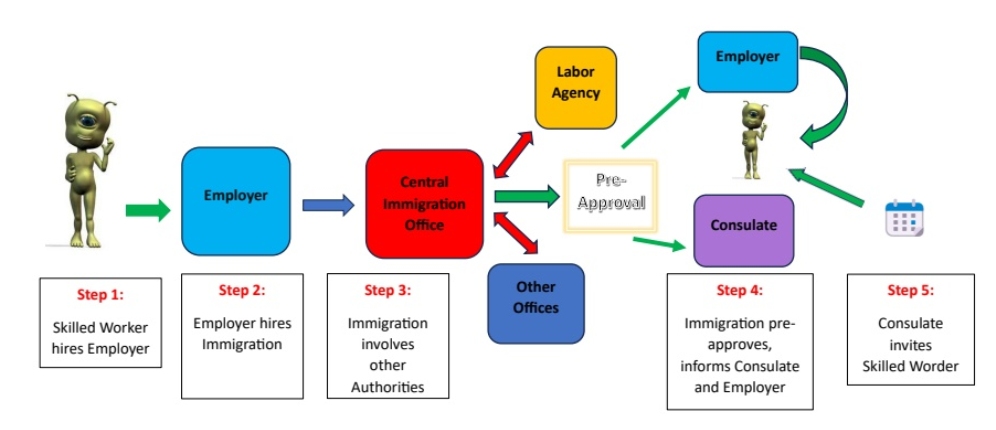Fast-track procedure for skilled workers
This page is intended to inform you what this "fast-track skilled worker procedure" is and how it works. Malicious tongues say that when authorities promise something in terms of "simplification" or "acceleration" or "improvement", then the opposite is the rule. This is not the case here at all! Yes, in any case, the fast-track skilled worker procedure brings a noticeable acceleration and predictability! In the hundreds of cases we have looked after, we have never seen a local immigration office or embassy put this fast-track procedure on the back burner!

What is the aim of the fast-track skilled worker procedure?
The aim of the fast-track skilled worker procedure is to offer the employer, in cooperation with the future skilled worker, the central immigration office of a federal state and the future employer the opportunity to reduce procedural delays when applying for a residence permit. The aim is to speed up the process. The foreigners authority at the employer's headquarters is the point of contact and project manager.
Who starts the accelerated skilled worker procedure?
The procedure is started by the skilled worker himself or herself by authorizing the employer.
For which professionals is the procedure suitable?
The fast-track skilled worker procedure can be applied for the following residence purposes:
- vocational training / in-company further training,
- for the implementation of measures for the recognition of foreign professional qualifications,
- employment for skilled workers with vocational training,
- gainful employment for skilled workers with an academic education,
- as a highly qualified specialist with an academic education in special cases,
- as a researcher,
- for employment as a manager, executive or specialist,
- for employment as another scientist or teacher,
- for employment as an IT specialist,
- for employment in justified individual cases of public interest,
- as a civil servant,
- as a professional driver with an EU or EEA driving license and the basic qualification according to §24 I BeschV,
For which people is the procedure currently not suitable?
This procedure is not permitted for the following situations:
- Postings of employees of an employer based abroad to Germany,
- Intra-company transfers,
- students,
- for exclusively temporary residence purposes (e.g. specialty chefs, au pairs),
- Professional drivers who do not have an EU or EEA driving license and the basic qualification according to §24 I BeschV,
Is family reunion possible as part of the fast-track procedure for skilled workers?
 Yes, in principle, spouses and registered partners as well as unmarried children who are minors can enter the country at the same time. A temporal connection exists within the first six months after the skilled worker's first entry. In the case of the "large Blue Card", (in-law) parents can also enter the country.
Yes, in principle, spouses and registered partners as well as unmarried children who are minors can enter the country at the same time. A temporal connection exists within the first six months after the skilled worker's first entry. In the case of the "large Blue Card", (in-law) parents can also enter the country.
What costs should my company expect?
The fee for the fast-track skilled worker procedure is currently €411 for the procedure as a whole (§47 I No. 15 AufenthV) - i.e. for all parties involved.
Are these all fees then?
Additional fees may be charged by the relevant authorities for translations, certifications, recognition of professional qualifications or similar. The recognition procedure costs up to €600, while certified translations of documents usually cost a mid-double-digit amount.
Can my company appoint someone else to carry out the procedure?
Yes, authorization is generally possible (§14 V VwVfG). However, the following points should be noted:
- The legislator assumes that the future specialist initially authorizes the employer to carry out the procedure. It is then sufficient for an authorized signatory (e.g. the management) to have another person within the company carry out the accelerated specialist procedure.
- The employer can delegate this activity to a relocator.
This relocation company will require a power of attorney from the employer. This company can ultimately only "pass through" the forms and "pass on" the communication. However, if something goes wrong, these companies are no longer allowed to do anything. At the latest, this would then constitute inadmissible legal advice - The employer can instruct a law firm instead.
The advantage of this constellation is that a real specialist takes care of the legal matter of "immigration". If the authorities actually have an incorrect legal opinion, action can be taken immediately without wasting valuable time searching. Lawyers have the task of turning an "accelerated" procedure into a "very accelerated" procedure. This is achieved by the law firm preparing everything in such a way that the clerks only have to nod everything off and can decide immediately.
How long will my company have to wait for the future skilled worker?
The answer to this question depends on several factors, which means that it is not possible to specify a period of time with any degree of certainty. In principle, the procedure should not take more than 16 weeks and the skilled worker should be able to enter the country within this period. You can shorten the processing time considerably if you submit all documents in full when you submit your application.
When does the fast-track skilled worker procedure end?
The fast-track skilled worker procedure ends for the central immigration authority when the preliminary approval is sent to the respective embassy and the employer.
What happens now? Can the skilled worker now enter the country?
No! The skilled worker can only enter the country if they do not require a visa to enter the country. Otherwise, as always, an entry visa must be applied for now.
Do I have to apply for an appointment at the embassy myself?
The fast-track skilled worker procedure does not replace the need to submit an application and documents to the embassy. Previously, there was only a preliminary examination and preliminary approval. The same documents must be submitted to the embassy with the preliminary approval (application forms, original certificates of professional qualification, employment contract, etc.). We will prepare a personal checklist for you that is tailored to your situation. Yes, we register our clients separately with the embassy so that the invitation requirement cannot be inadvertently overlooked. In the case of visa-free entry, we inform the relevant immigration office for a quick invitation.
When does the skilled worker get an appointment at the embassy?
Contrary to "normal" procedures, the fast-track skilled worker procedure is really very fast! The embassy only has three weeks to invite the skilled worker to attend and submit the application and documents. The embassies adhere to this!
How long does the embassy have to process the application?
After the skilled worker has submitted all the documents to the embassy, the authority may only take three weeks to decide on the application. This is a legal obligation! This also happens regularly.
However, we have experienced among our colleagues that the embassy took much longer than promised to make a decision. How so?
This can happen even though the embassy has only 3 weeks to decide according to the letter of the law in §81a AufenthG. It is 99% certain that the reason is that not all documents were submitted in full. The embassy may only decide on the basis of proven facts. If something is missing, the authorities must request the missing documents. Then everything just takes longer. This is precisely why we provide our clients and each family member with a personal checklist so that nothing is forgotten. It is our aim to ensure that this fast procedure really does remain fast!
What does the embassy decide?
If you receive a positive decision from the diplomatic mission in your home country or current place of residence, you will receive a national entry visa. Such a visa is for the first entry, the first stay and is now generally issued for one year. The skilled worker can work from the first day of entry to the extent permitted in the visa, even if they do not yet have a residence permit or EU Blue Card.
Do I really need an entry visa?
The answer is a very clear "Yes!" or "No!". It depends on whether the skilled worker requires a visa to enter the country. We have described who this is on another page.
What should I do if my entry visa expires?
The skilled worker must submit an application for a residence permit to the relevant immigration authority in Germany before the visa expires.
How long does it take to get an appointment at the immigration office?
With all due respect, don't ask us - ask God Almighty. He will know... Now, seriously! It can't be estimated at all, because the authorities have too few clerks in case of doubt, and the clerks are often bothered with unnecessary correspondence. Berlin, for example, has around 400 clerks to serve around 1.5 million foreign residents. With the best will in the world, no more is possible than now. However, Berlin is a pioneer in digitalization and automatic processing.
So if the skilled worker does not get an appointment before the entry visa expires, they become illegal? Right?
Yes and no! The appointment and the interview are not decisive for the legality of the further stay here. The appointment is only for granting. If skilled worker has applied for a residence permit before the entry visa expires, the stay is legal until the immigration authority decides on the application (§81 AufenthG). The authority is obliged to issue a so-called "interim permit" aka Fiktionsbescheinigung.
